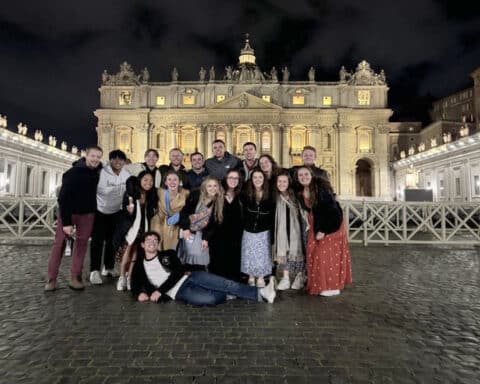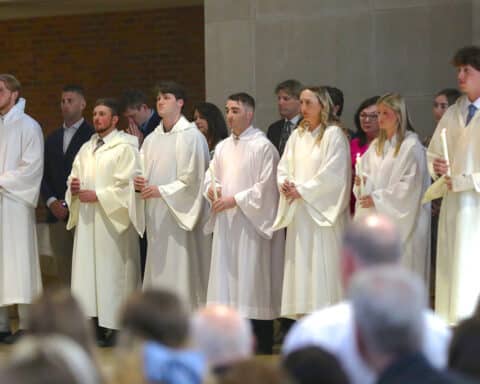The director of religious education in a parish can almost be thought of as a Catholic school principal of sorts.
In any given year, a parish DRE is responsible for providing a basic religious education to hundreds, if not thousands, of children from kindergarten through high school, all of whom come from families with differing levels of faith practice at home.
The DRE must not only know how best to educate and prepare young Catholics to receive first holy Communion and confirmation, but also has to be able to work with pastors, other lay ministry leaders in the parish and catechists who volunteer their time to teach Sunday school.
“The directors of religious education have a lot of work in terms of just getting the volunteers they need, to staff their parishes and making certain that those catechists are well-formed,” said Ted Whapham, dean and associate professor at the Neuhoff School of Ministry at the University of Dallas.
Read more Catholic College special section articles here.
“There is a lot of work directed toward that, while at same time presenting an atmosphere in the parish that’s welcoming, nurturing and that provides a solid Catholic foundation,” Whapham told Our Sunday Visitor.
Catholic universities and colleges are educating and forming future parish directors of education by providing them with foundations in catechetics and theology, often rounding that out with practical experience in ministry to prepare tomorrow’s DRE’s for the kind of pastoral work they will be entrusted to carry out.
“Having a pastoral heart is absolutely necessary, especially the ability to meet folks where they’re at,” said Whapham, who added that catechesis and religious education at the parish is “one of the foundational places” where the Church still passes on its faith to the next generation.
‘Vocation to serve’
Whapham said the Neuhoff School of Ministry utilizes the U.S. Conference of Catholic Bishop’ document “Co-Workers in the Vineyard of the Lord,” which laid out standards for lay ecclesial formation. Whapham said the document presents four pillars of formation: intellectual, pastoral, spiritual and human formation.
“We focus on all those areas,” said Whapham, adding that the university’s programs are designed to provide basic-level competence at the graduate level in foundational domains of theological knowledge, Scripture, Church history, doctrine and moral theology.
“We start at that level, making sure they have basic foundation and knowledge of their faith,” Whapham said.
Jem Sullivan, a visiting professor of catechetics at The Catholic University of America’s School of Theology and Religious Studies, told Our Sunday Visitor that being an effective director of religious education is about more than being competent with core skill sets.
“It really is a vocation to serve the Church,” said Sullivan, the author of several published books on faith and catechetics, including “Believe Celebrate Live Pray: A Weekly Walk with the Catechism” (OSV, $16.95).
“It’s important to first start with asking, ‘What is catechesis?’ At the heart of it, we find a person; the person of Jesus of Nazareth,” Sullivan told Our Sunday Visitor.
“Because religious ministry is a pastoral ministry, it’s pastoral theology, and the DRE’s ministry unfolds at the parish level, the DRE should first be a person who’s encountered the person of Jesus Christ, and is growing in love for the Lord, and love for the body of Christ, the Church,” Sullivan said.
“I think above all, a DRE needs to be one of those saints next door,” Sullivan added. “Not a perfect person, but someone who is on the path of maturing as a person, as a believer, as an apostle, as a missionary disciple, someone who is a living reflection of Christ in the world. The DRE should be someone who knows the art of accompaniment, someone who is able to walk with people on their journeys of faith. They should be someone who loves being with people and being there for the whole community.”
Theological, spiritual foundation
Julie Rubio, a professor of Christian social ethics at the Jesuit School of Theology at Santa Clara University, told Our Sunday Visitor that a parish director of religious education also needs a serious grounding in theology.
“People have questions that aren’t often answered by soft theology,” Rubio said. “We need to offer them something better. So yes, (DRE’s) need to read Karl Rahner and Rerum Novarum. They need to be able to express that theology in language that is both clear and compelling.”
Ronald Bolster, assistant Professor of theology and the director of catechetics at the Franciscan University of Steubenville, told Our Sunday Visitor that the most fundamental skills for someone in a parish leadership position like a director of religious education to have are the spiritual gifts.
“It’s looking at it not just as teaching a body of content, but oriented toward conversion and making disciples of Jesus Christ,” said Bolster, who added that a solid theological training in and of itself is not enough for a catechist.
“We provide formation oriented at deepening their knowledge of the Faith, and with honing the ability and techniques they need to communicate that content,” Bolster said. “They become knowledgeable of the Faith, and the delivery of the Faith through methodology is the heart of the foundation of our program that we endeavor to impart to our students.”
Rooted in Catholic tradition
Rubén Rosario Rodríguez, professor of theological studies and the director of master’s degree programs at St. Louis University’s Department of Theological Studies, told Our Sunday Visitor that faculty meets with officials from the Archdiocese of St. Louis to gauge what they perceive to be the needs for religious education instructors.
“What we got from them is they wanted (students ) to have a solid grounding in the history of the Catholic tradition,” said Rodríguez, who added that students are required to complete courses in Church history, as well as courses in the Old and New Testaments. Issues specific to becoming a Catholic school educator or a parish director of religious education are also covered.
“Our strength is a rigorous academic program with a grounding in courses in school of education that are more practical to any setting,” Rodríguez said.
Whapham, of Dallas University, and other Catholic university officials said the prospective directors of religious education they see are often young adults or middle-aged people embarking on new ventures after leaving careers in the secular world.
Both cohorts arrive in the classroom eager to evangelize in their parishes and provide solid catechetical foundations.
Said Whapham, “If you look at the relationship between catechesis and evangelization, and the ways that we need to be welcoming, then we need to make certain that we’re focused on the kerygma, the basic content of the Faith and passing that on, as well as helping people to have the solid understanding of the Church’s teaching, and do so in a way that’s faithful.
Brian Fraga is a contributing editor for Our Sunday Visitor.





